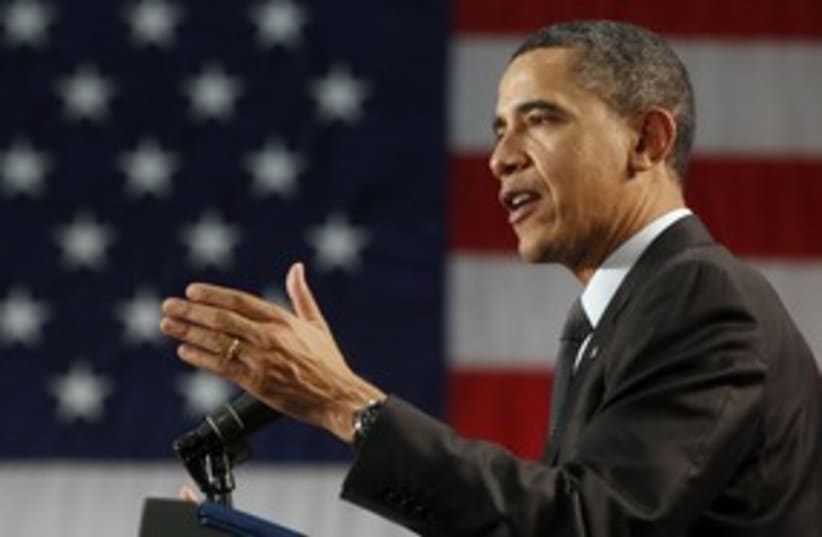PM: Abbas 'blatantly distorting' known, documented historyThe US president plans to deliver a major policy speech on the "Arab spring" on Thursday, meet Prime Minister Binyamin Netanyahu on Friday and give an address at AIPAC’s opening session on Sunday.White House Press Secretary Jay Carney on Monday said the AIPAC address would “stress the importance of the US-Israeli relationship,” but would not be “a major policy speech.”Earlier on Tuesday, Obama met with Jordan's King Abdullah, pledged to keep pressing for a two-state solution to the Israeli-Palestinian conflict, despite his failure so far to break the impasse.But Obama, who wants to reconnect with an Arab world showing signs of frustration with his approach to the restive region, offered no new ideas for advancing the peace process.With the Jordanian monarch sitting at his side in the Oval Office, Obama suggested that unrest sweeping the Middle East offered a chance for Israel and the Palestinians to seek progress toward resolving their own decades-old dispute."Despite the many changes -- or perhaps because of the many changes that have taken place in the region -- it's more vital than ever that both Israelis and Palestinians find a way to ... begin negotiating a process whereby they can create two states living side by side in peace and security," he told reporters.Obama is struggling to counter Arab perceptions of an uneven U.S. response to a wave of popular uprisings and disarray in his Israeli-Palestinian peace strategy. He hopes to use the U.S. killing of Osama bin Laden, which for now has boosted his standing at home and abroad, as a chance to reach out to a large Arab audience.Obama and Abdullah also sought common ground on the unrest that has gripped the Arab world, toppling autocratic US allies in Egypt and Tunisia and engulfing Libya in civil war.Jordan has faced protests demanding curbs on the king's powers but not nearly of the magnitude confronting neighbors Syria, Yemen and Bahrain. He replied in March by sacking his unpopular prime minister and promising constitutional changes.Trying to show that reforms by Washington's autocratic Arab allies will not go unrewarded, Obama praised Abdullah and pledged to help Jordan with fresh US economic and food aid.The king, a US ally and key player in past peace drives, made clear he wanted a renewed push by Obama. Jordan and Egypt are the only Arab states with peace treaties with Israel."We will continue to partner (with Jordan) to try to encourage an equitable and just solution to a problem that has been nagging the region for many, many years," Obama said.
Obama reaffirms 'unshakable commitment to Israel'
US president marks Jewish American Heritage Month with reception at White House; pledges to keep pressing for a two-state solution.

PM: Abbas 'blatantly distorting' known, documented historyThe US president plans to deliver a major policy speech on the "Arab spring" on Thursday, meet Prime Minister Binyamin Netanyahu on Friday and give an address at AIPAC’s opening session on Sunday.White House Press Secretary Jay Carney on Monday said the AIPAC address would “stress the importance of the US-Israeli relationship,” but would not be “a major policy speech.”Earlier on Tuesday, Obama met with Jordan's King Abdullah, pledged to keep pressing for a two-state solution to the Israeli-Palestinian conflict, despite his failure so far to break the impasse.But Obama, who wants to reconnect with an Arab world showing signs of frustration with his approach to the restive region, offered no new ideas for advancing the peace process.With the Jordanian monarch sitting at his side in the Oval Office, Obama suggested that unrest sweeping the Middle East offered a chance for Israel and the Palestinians to seek progress toward resolving their own decades-old dispute."Despite the many changes -- or perhaps because of the many changes that have taken place in the region -- it's more vital than ever that both Israelis and Palestinians find a way to ... begin negotiating a process whereby they can create two states living side by side in peace and security," he told reporters.Obama is struggling to counter Arab perceptions of an uneven U.S. response to a wave of popular uprisings and disarray in his Israeli-Palestinian peace strategy. He hopes to use the U.S. killing of Osama bin Laden, which for now has boosted his standing at home and abroad, as a chance to reach out to a large Arab audience.Obama and Abdullah also sought common ground on the unrest that has gripped the Arab world, toppling autocratic US allies in Egypt and Tunisia and engulfing Libya in civil war.Jordan has faced protests demanding curbs on the king's powers but not nearly of the magnitude confronting neighbors Syria, Yemen and Bahrain. He replied in March by sacking his unpopular prime minister and promising constitutional changes.Trying to show that reforms by Washington's autocratic Arab allies will not go unrewarded, Obama praised Abdullah and pledged to help Jordan with fresh US economic and food aid.The king, a US ally and key player in past peace drives, made clear he wanted a renewed push by Obama. Jordan and Egypt are the only Arab states with peace treaties with Israel."We will continue to partner (with Jordan) to try to encourage an equitable and just solution to a problem that has been nagging the region for many, many years," Obama said.